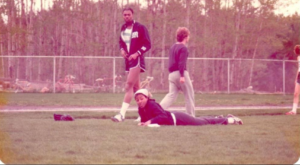Written by Lauren O’Dell.
There are times where I wished I had never walked away from my sport. I was on the recovery side of both of my injuries, I was beginning to develop healthier eating habits, and I had a true vision of the athletic goals I wanted to tackle in my last year and a half at Ithaca College. However, this constant ‘what if’ mindset is what made me leave in the first place–the constant uncertainty of myself, the comparison to my teammates– I had reached my ‘moment of no return’ and I needed to give myself some room to breathe.
Although the majority of my rowing career was marinated in toxicity, it didn’t start out that way. My father was the one who got me into the sport in the first place; he bought a 1987 Vespoli racing single at a boathouse in Syracuse, NY to use as an alternative for his intensive training in running before I was even born. I was always in awe of that boat–the way the 27ft long, 11in wide shell could hold someone so large, yet stay afloat. As soon as I hinted at the slightest bit of interest, my dad sat me down at the rowing machine (or ergometer, as it is formally called) and asked me to pull as hard as I possibly could for 500 meters. As skeptical as I was, I did as he asked and was surprisingly happy with my result. Safe to say, I knew I’d be continuing with the sport.
My mom was just as responsible for getting me into a boat. Being a high school English teacher, she is always forming strong connections with her students. Some of the freshmen she had in class were members of Pittsford Crew, a local club in the Rochester, NY area. She told them about my experience on the ‘erg’ and they became wide-eyed and begged her to sign me up for the Learn-to-Row program that was held every summer at the Pittsford Crew boathouse. June 24, 2013 would remain a day that changed the course of my life permanently–it was when my novice coach pulled me aside after one of my first rows on the water and said to me, “Lauren, you’re going to be a great rower.” As simple as it was, that moment inspired me to invest my entire being into something that would consume my existence as a whole.
The sport is as painful as it is graceful. Every muscle in the body plays a role in getting the boat to the finish line first. It demands excellence. I loved the rhythmic aspect of it as well–every movement was performed in perfect sync. As I became more competitive in high school, I enjoyed pushing myself to new levels, focusing only on the numbers. Every workout, every race, it was all based on time.
Speaking of time, let’s talk about the 2k: rowers know exactly what I’m talking about. For all of the non-rowers, the 2000m race is the most exhilarating yet excruciating 8 min of a rower’s life. It can make or break an athlete–it took me years to figure out how to conquer this beast. From my personal experience, I remember two different voices in my head. One was screaming “you might as well stop now, there’s no way you’ll get the time you want…you’re weak” while the other one was coaching me and telling me to keep going with everything I have, “I totally got this.” The only way I could do well on my 2k tests was if the positive voice was louder than the negative one. Some days, this wouldn’t be the case, and I would end up letting my negativity and fear get the best of me.
Over the course of my rowing career, I became so obsessed with achieving a certain level of perfection, that instead of applauding myself for how far I had gotten, I only analyzed my failures and worried about how far I had to go. This really became an issue during my sophomore year of college. After transferring colleges, I wanted a fresh start, so this meant putting 1000% of my body and soul into this new team. Ithaca College Women’s Rowing is a very competitive division III program with an esteemed reputation. I didn’t want to seem weak in any way.
The team seemed great from the outside–they emphasized values of family, support, inclusion, and healthy competition. I quickly learned that in order for these values to ring true, I would have to befriend individuals who supposedly had a large impact on the dynamic of the entire team. As I got to know more of my teammates as weeks went by, I started to question whether the team was competitive, or just extremely toxic. People would constantly ask me questions about my training that seemed a little too intrusive. They wanted to know my specific time goals for erg tests, what seats I wanted in the boat, why my goals were so “unrealistic,” and would even ask if I was sure I was able to be on the varsity team in the first place. I already felt out-of-place as it was, I didn’t want anything else fueling my severe anxiety.
I soon became infatuated with my weight. I would work out close to four times a day, while eating little to no dinner and then binging on a huge box of Goldfish late at night. As an athlete who is a notorious stress-eater, I used the extra workouts as a way for me to keep the extra weight off, but also to keep up with my teammates, the individuals I was constantly comparing myself to in every way.
December 2018 was truly devastating. I was experiencing intense spasms in my thoracic spine, I could barely bend over to touch my toes, and since I couldn’t work out, I fell into the first of many phases of short-term depression. My entire existence felt as though I had no purpose. To top it off, less than two months later, I broke my foot and was stuck in a boot for 6-8 weeks. I was about to lose my mind. As competitive as I was, I was also stubborn and impatient. I tried to work through both injuries, and ended up failing miserably. My foot was not completely healed until the fall of 2019, and I still tend to experience some spasms from time to time, but they’re not as bad as they once were. I started pushing too hard, too early. It was hard for me to just sit in the back of the weight room, watching everyone achieve their goals while I was doing nothing. On our spring training trip to Gainesville, Georgia in March of 2019, I experienced multiple back spasms but did not want to tell anyone because I didn’t want to be taken out of my seat in the top boat.
As time went on, my unhealthy habits became more prevalent–I started to isolate myself from my teammates, I would go half the day without eating and then would binge at night, and I didn’t want to ask for help at all. It was lonely and miserable, I could barely breathe.
The final moment that led to my breaking point was the fall season of 2019–my junior year. I had spent the summer in therapy, talking about ways I could continue rowing without feeling anxious, belittled, or self-conscious. It was a summer of healing, and it was actually working throughout the first few weeks of the season, but it all completely erased as soon as I stepped into the boathouse on October 9, 2019. I remember the day so vividly–I was re-doing a 5k erg test to try to earn a spot in the boat that was going to the Head of the Charles regatta in Boston, MA. I started out strong, attaining the exact time I needed to make the boat and I was feeling great. I felt the presence of a few of my teammates, and most of them were cheering me on. One individual, however, was not. She was constantly critiquing me on my technique, yelling “C’mon Lauren…” but in a pessimistic tone that made me want to stop. As I got to about halfway through the 5k, she said “Lauren, you need to sit up.” I stopped. I put my handle down, stood up, looked at her and said “thanks for the tip,” and left.
After that, my coaches began to have conversations with me about how I was “unstable and unpredictable,” how I “needed to figure out what my priorities were in the sport,” and how my “teammates were concerned about my progress because it was clear that I was becoming less of a competitive asset.” They weren’t helping me in any way, they were just emphasizing things I already knew. They saw that I was giving up and didn’t even give me a chance to redeem myself with their support–it was their lack of faith that made me want to get up and go to practice even less.
It took me months, questioning everything, to finally acknowledge that not only was rowing no longer fun for me, but it was the only stressor in my life that had a negative impact on my health. Even the hardest classes had little to no impact on me. There would be times I would be so stressed about the team, coaches, an erg test, max testing day in lifting, etc., I would become nauseous and not be able to leave my bed because the nausea would turn into an intense migraine.
After one too many migraines and breakdowns, I returned to school after Thanksgiving break at the end of 2019 with a single thought in my mind: I needed to be done. I had cried too many tears, skipped too many meals, and spent too much time questioning who I was to continue with something that had, at one point, been a contributor to the purest form of joy in my life.
I want to tell this story about my complicated history with rowing (in a nutshell, of course) because I need to be able to acknowledge that although a large portion of my life was spent in a boat, it’s time for me to turn the page and move onto other things. I had talked to my family about my experiences, and even a few friends, but I was always so scared to talk about my struggles because I thought no one would understand or care. Turns out, there are plenty of rowers who experience the same issues as me, and I want to make clear that no one should have to feel like an outsider on a team. That’s not what sports are about, especially rowing. Rowing is about trust, competitiveness, sharing moments of sheer pain and joy together, and comparing the gnarly calluses on our hands. I wouldn’t wish my past experiences on anyone. It has taken me a long time to accept all of the decisions I’ve made with rowing, both good and bad.
My sport has shaped me into the individual that I currently am, but it does not define who I am going to be in the future. My relationship with food has increased, I can now touch my toes, and I am going to be successful in the future, whether I’m rowing or not.
Since taking a step away from the rowing world, I now have a newfound appreciation for being a spectator instead of a competitor. I can watch my younger sister conquer her own rowing journey, and I have a front row seat. The rhythm of the oars entering and exiting the water at the same time, the clicking of the oarlocks, the beads of sweat dripping down the back of my neck, the burning sensation in my lungs after an intense race, I remember it all. The sport is so beautiful, it looks almost effortless, yet it is quite the opposite. Rowing has brought me some of the best and worst days of my life, and I wouldn’t trade it for anything in the world.





